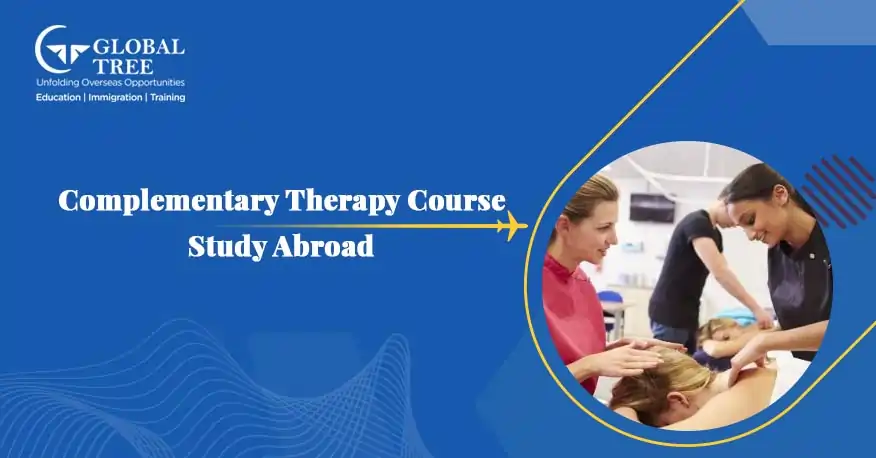All About Complementary Therapy Course to Study Abroad

Introduction
A subspecialty of medicine known as complementary therapy offers therapy in addition to allopathic medicine and treatment. Alternative therapy is another name for it. Additionally, it is offered to those experiencing psychiatric problems, discomfort, and emotional distress. As more public and commercial organizations search for alternative therapists to give their employees better health care, the need for complementary therapy is rapidly increasing.
Aromatherapy, tai chi, music therapy, acupuncture, and massage are just a few of the complementary therapies available. Based on a client's symptoms and development over time, a complementary therapist will recommend the best course of treatment.
Hospitals, healthcare institutes, psychological institutions, and private clinics all employ complementary therapists. They must first establish a trusting relationship with the client before delivering therapy and assessing the client's development. Choose the Best Complementary Therapy Course & Colleges to Study Abroad.
Who is eligible to study a Complementary Therapy Course Abroad?
Complementary treatment is a wonderful fit for you if you have an ordered personality, a warm and comforting disposition, and a kind demeanor. It's important to be able to connect with clients in a way that makes them feel heard and comfortable when providing complementary therapy.
A competent complementary therapist will be sympathetic, clean, reliable, consoling, and self-assured. To determine the appropriate length of therapy required for a specific client, the therapist needs also to possess emotional intelligence. If you think you have the aforementioned traits and this seems fascinating to you, you should think about exploring complementary therapy.
How much does it cost to study Complementary Therapy Course Abroad?
There are numerous ways to learn complementary medicine. Because different therapies require different training, each therapy's style will determine the qualification. Depending on the length and style of training, you could obtain different certificates in various therapies, and their cost varies.
Depending on the type of complementary therapist you want to become, there are different educational requirements. For instance, if you want to work as a chiropractor, you must obtain a professional or doctoral degree, which requires four to five years of postsecondary study as well as supervised clinical experience. While acupuncturists would need to obtain a master's degree in Acupuncture, massage therapists can complete their training in less than a year.
The concepts, theories, and practices of their area of expertise in therapy must also be studied by other alternative therapists. Therapists must also pass the state licensing exam, the qualifications for which can differ from state to state.
Even so, some colleges may provide a thorough bachelor's program in complementary therapy. A bachelor's program will often have a stronger academic and research focus. It may cost $22,696 a year on average.
What is the Future Scope of Complementary Therapy Course Abroad?
As it is shown to have a calming and soothing effect on clients suffering with emotional and psychological distresses, complementary therapy is a profession that is constantly expanding. Complementary therapy is always in demand since it supports the process of conventional therapy. There was an enormous need for alternative therapists following the epidemic, particularly when depression rates skyrocketed.
As more individuals become aware of the benefits of complementary therapy, its position in the labor market will only expand. The job market for massage therapists, chiropractors, and acupuncturists is anticipated to increase by 4%, 12%, and 21%, respectively, according to the U.S. Bureau of Labor Statistics.
(Read more: best countries to study medicine)
Trending Career Options in Complementary Therapy Course Abroad
Take advantage of your knowledge or transferable abilities to explore a variety of careers in complementary therapy.
Career as a Chiropractor
As a chiropractor, it will be your duty to use physical manipulation, massage, and therapeutic exercise to treat patients who have a variety of conditions, mostly involving the spinal cord. Arthritic pain, back, shoulder, and neck discomfort, joint stiffness, and muscular aches are a few of the issues you might tackle. As a chiropractor, you must perform physical examinations on your patients and obtain thorough medical histories from them. With the help of your client, you will create a management strategy using this information.
Career as an Acupuncturist
One of the most well-known subfields of supplementary therapy is acupuncture. Acupuncturists place tiny needles into specific acupuncture points in an attempt to restore balance because they believe that pain is a sign that the body is out of equilibrium. The body's natural healing process is aided by this. Musculoskeletal, pulmonary, gynecological, and other physical and mental ailments are treated by acupuncturists.
Career as an Osteopath
An osteopath treats a variety of diseases, including back and joint pain, arthritis, headaches, migraines, and digestive issues, using manual treatment techniques including massage and physical manipulation in addition to exercises. An osteopath's responsibilities include disease diagnosis, treatment, and prevention.









